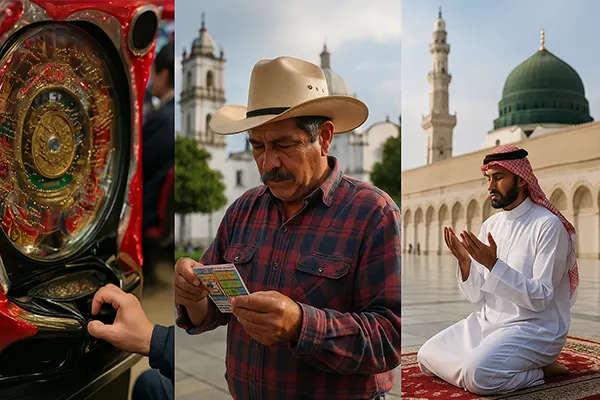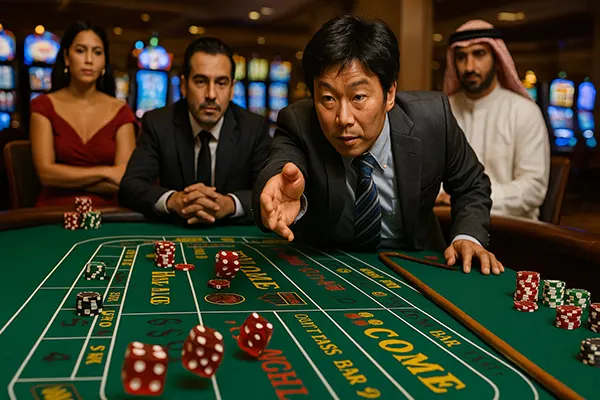
Gambling in Different Cultures: How People Play in Mexico, Japan, and Saudi Arabia
Gambling practices vary significantly across the globe, shaped by legal restrictions, cultural traditions, and societal attitudes. While some nations embrace gambling as part of their national identity, others prohibit it altogether based on religious or moral grounds. This article explores gambling in three distinct cultures — Mexico, Japan, and Saudi Arabia — offering insight into how local customs and legal frameworks influence how people engage with games of chance.
Legal and Cultural Framework of Gambling
In Mexico, gambling is generally legal and regulated by the Secretaría de Gobernación (SEGOB). Traditional games such as lotteries and cockfighting coexist with modern casinos and sports betting. Legal land-based casinos have operated since the early 2000s, and online gambling is permitted if operators hold a licence. Gambling is widely accepted in Mexican culture and is often linked with social gatherings and festivals.
Japan has a more nuanced stance. Most forms of gambling are technically illegal under the Penal Code, yet certain exceptions are allowed, such as betting on public sports (horse racing, cycling, boat racing), lotteries, and pachinko — a vertical pinball-like machine that operates in a legal grey zone. In 2018, the country approved Integrated Resorts, paving the way for casino development under strict regulation to boost tourism and economic growth.
Saudi Arabia, conversely, has a complete ban on all forms of gambling under Islamic law (Sharia). The Qur’an explicitly forbids games of chance, and the Kingdom strictly enforces these rules. There are no legal gambling establishments, and even online gambling is blocked by government filters. Engaging in gambling can lead to legal penalties, including fines and imprisonment.
Social Acceptance and Everyday Gambling Practices
In Mexico, gambling is seen as an acceptable leisure activity across various age groups. Betting on football matches, horse races, or participating in bingo nights are common, especially during national celebrations. The National Lottery is deeply ingrained in Mexican life, often associated with traditions dating back to colonial times. Local neighbourhoods may also host informal gambling games during festivals.
Japanese society maintains a paradoxical relationship with gambling. While gambling is largely banned, pachinko parlours are widespread and attract millions of players daily. Though technically not gambling — players win tokens exchangeable for prizes and later for cash — it functions similarly. The social acceptance of pachinko has created a massive industry valued at over ¥14 trillion annually (approx. $95 billion as of 2025).
In Saudi Arabia, even minor games of chance like raffles or sports betting are not tolerated publicly. The social stigma around gambling is significant due to its religious context. However, there is a growing concern among authorities about citizens accessing offshore betting websites via VPNs, prompting increased internet surveillance and education about the dangers of gambling from an Islamic perspective.
Gambling Regulation and Enforcement
Mexico’s gambling sector is overseen by SEGOB, which ensures that operators comply with laws on age restrictions, taxation, and transparency. Although enforcement is relatively consistent, some regions report issues with unlicensed operators and weak oversight in remote areas. Still, the government continues to modernise regulations to align with global standards, including online operator registration and responsible gambling mandates.
Japan’s gambling regulation is handled through various ministries, depending on the type of activity. For example, the Ministry of Finance oversees the lottery, while the Japan Racing Association regulates horse racing. The introduction of Integrated Resorts includes the Casino Control Commission, tasked with preventing gambling addiction and criminal activity. Strict entry restrictions for locals, including entrance fees and visit limits, are already enforced.
In Saudi Arabia, the state does not tolerate any form of legal gambling, and the enforcement is strict. The government actively blocks gambling-related websites and monitors online activity to identify violators. Religious police, known as the Committee for the Promotion of Virtue and the Prevention of Vice, historically played a strong role in enforcement, although their presence has been reduced in recent years due to legal reforms.
Economic and Social Impacts of Gambling
In Mexico, the gambling industry contributes significantly to the national economy. The government earns revenue through licensing and taxation, which is then reinvested in infrastructure, health, and social programs. The employment opportunities provided by casinos, bingo halls, and sports betting shops also support thousands of families across the country.
Japan’s economic ambitions with gambling are tied closely to tourism. Integrated Resorts are designed not just as casinos but as entertainment hubs featuring hotels, shopping centres, and conventions. The government estimates that these resorts could generate over $10 billion annually. However, there is concern about the rise in gambling addiction, prompting the implementation of national support programmes and treatment facilities.
In Saudi Arabia, the absence of a gambling sector means there are no direct economic contributions. However, concerns about illegal gambling and underground betting markets remain. Authorities argue that banning gambling protects the social fabric and moral integrity of society, avoiding the financial and psychological problems seen in countries with legalised betting industries.

Future Outlook and Cultural Shifts
Mexico’s gambling landscape is likely to expand in the coming years, especially online. As internet access improves and mobile platforms grow, more players are turning to digital casinos. The government is expected to introduce updated frameworks to regulate online operators more strictly while promoting responsible gambling awareness.
In Japan, the future of gambling hinges on the success of Integrated Resorts. The first resort is expected to open by 2029 in Osaka. Public sentiment remains divided — some see it as an economic boon, others worry about social costs. Policymakers are treading carefully to balance cultural values with business interests.
Saudi Arabia shows little sign of changing its stance on gambling, as religious law remains a cornerstone of national governance. However, as digital borders become increasingly porous, the state faces the growing challenge of curbing access to international gambling platforms. Public awareness campaigns and stronger cybersecurity are likely to remain key strategies.
Cultural Identity and the Role of Gambling
Gambling in Mexico is woven into the cultural fabric, often seen during holidays, religious festivals, and family gatherings. It blends modern entertainment with age-old traditions, such as the “Lotería” game resembling bingo, played for fun and small prizes in communities.
In Japan, gambling — especially through pachinko — serves as a societal release valve. Despite its legal ambiguity, the practice is deeply embedded in daily life, particularly among middle-aged men and retirees. It is seen less as a means to profit and more as a form of routine escapism and social interaction.
Saudi Arabian identity is largely based on Islamic principles, which are reflected in the total rejection of gambling. The cultural narrative positions gambling as a moral vice, and the government emphasises values like discipline, family, and spiritual responsibility. This foundational worldview ensures that gambling remains off-limits for the foreseeable future.
